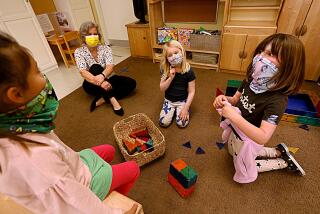Mothers’ Role in Workplace
- Share via
Demands New Approaches Government and business need to address rising numbers Most new mothers now return to work before their infants can walk. This finding by the U.S. Census Bureau surely came as no surprise to millions of American parents hustling their children out the door each morning, heading first for school or day care and then to work. Yet the results of this survey of 57,000 U.S. households are sure to reignite a fiery, decades-old and now tiresome debate about whether mothers should work at all.
Each horror story in the news seems to fan the flames anew. A nanny is convicted of killing the 8-month-old in her charge and some finger waggers blamed the baby’s mother for working. Never mind that she worked only part-time and that even on the days she worked she came home to breast-feed her son. Rising heroin use among affluent teenagers in a Texas suburb? Youth gang violence rocking poor neighborhoods in Los Angeles? The glib response too often is to point the finger at Mom, whether she’s a high-paid professional or toiling in a minimum-wage job.
Time out. How about some more constructive thinking on the conflicts between the work and family responsibilities most American mothers and fathers now shoulder?
According to the new Census Bureau report, based on 1995 data, 55% of new mothers surveyed returned to work within 12 months of giving birth. In 1976, when the Census Bureau first began to track the trend, the comparable figure was only 31%. The older and more educated the mother, the more likely she is to return to work before her child turns 1.
The numbers of working mothers are new, but the trends in this study are not. A steady increase in the employment of mothers has been documented for more than two decades. Even during the 1950s, the image of the man who brought home the bacon and the woman who cooked it was a chimera for poor families. And the high incidence of clinical depression during the 1950s and 1960s among middle-class housebound women told of the dark side of the picket-fence dream.
Most women--mothers or not--are now in the work force more or less to stay, of necessity or choice or some of both. Parents need help to do better by their kids and in their jobs.
The first step is a better understanding of the causes of the many stresses on families and children. A valuable tool may be the new Council on Contemporary Families, which hosted its first national conference last month. The group says it will pursue serious research, not politicized sound bites, on such issues as the effects of child care and single-parent households on children’s health and welfare. Too often, researchers complain, statistical correlations, such as between single-parent homes and poverty or between divorce and teen drug use, are presented as causes and effects when they are not. For example, acrimony and poor communication between parents and children may explain drug use or delinquency better than the fact that a divorce occurred after years of dysfunction.
The next step is for policymakers and businesses to seriously consider ways to allow their workers to do better on the job and at home. Flextime, measurements of productivity that depend less on “face time,” better child care, possibly even paid parental leave would help enormously.
These are daunting challenges as companies continue to downsize while expecting more from their employees. But the alternative is more finger pointing, more stressed-filled families, more unhappy employers and more children with out-sized problems.
More to Read
Get the L.A. Times Politics newsletter
Deeply reported insights into legislation, politics and policy from Sacramento, Washington and beyond. In your inbox twice per week.
You may occasionally receive promotional content from the Los Angeles Times.










